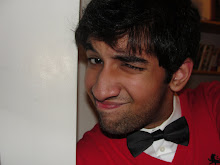Friday, March 23, 2012
Theater: Death of a Salesman
There's fewer pleasures in life for someone infatuated with performance art than watching a performer live at the top of their game hitting their sweet spot in stride. I've arguably seen it before in Cate Blanchett doing Blanche DuBois in Liv Ullman's production of A Streetcar Named Desire. I've seen Lauren Brown do "There Are Worse Things I Could Do" in my high school's production of Grease (trust me, it was incredible). I sadly don't get the treat very often of going to the theater, however, sad though it is that I've missed out on Jennifer Holiday performing the original "And I Am Telling You," Paul Robeson as Othello, or, more recently, Mark Rylance in Jerusalem.
Never though have I witnessed such explosive energy as I had in the current Broadway production of Death of a Salesman. The casting had understandably aroused some questions, between Philip Seymour Hoffman seeming too young and intellectual for the part and Andrew Garfield too meek. Linda Emond went relatively unscathed in the public scrutiny for lack of relative career exposure, though she may well find herself a Tony winner come June for her fantastic work as an aging woman who has nothing left but to stand by her slowly slipping husband.
All three central actors played their roles as unconventionally as their very casting choices, shedding light on different dimensions to their characters not often seen in the countless productions of this American classic before, utilizing their various "sweet spots" as actors to open up new possibilities of interpretation. For Philip Seymour Hoffman, it's less the old world weariness that Lee J. Cobb brought to the role in spades as it is his ability to wear a self-pity on his sleeve even as Willy himself outwardly denies it — which makes it that much more heartbreaking when his worst apparent fears become realized.
For Andrew Garfield, it's a deeply internalized sense of quiet repression that intelligently expressed so much of how Miller wrote Bif in his strained relationship with his father, his defeatist attitude towards settling down with a career, his remorse over the way things have gone. His arc continued to what Garfield does best in an explosive climax where he gradually breaks down with such technical skill that left everyone in the theater sniffling as they left the theater. Despite a delicate frame and innate sensitivity, the sheer force of his presence at such emotional peaks secures him comfortably in the top tier of actors in his generation that I'd be surprised doesn't deliver him a Tony Award this year.
The combined electricity of all these actors under Mike Nichols' seasoned direction is such a treat, emotionally devastating though it is, and leaves you rethinking the themes of Arthur Miller's masterpieces long after the curtains close.
Subscribe to:
Post Comments (Atom)


Nice review, Ibad. We're seeing this tomorrow night!
ReplyDelete